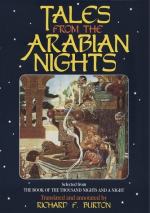[FN#1] Lane (vol. iii. 1) calls our old friend “Es-Sindibad of the Sea,” and Benfey derives the name from the Sanskrit “Siddhapati"=lord of sages. The etymology (in Heb. Sandabar and in Greek Syntipas) is still uncertain, although the term often occurs in Arab stories; and some look upon it as a mere corruption of “Bidpai” (Bidyapati). The derivation offered by Hole (Remarks on the Arabian Nights’ Entertainments, by Richard Hole, LL.D. London, Cadell, 1797) from the Persian abad (a region) is impossible. It is, however, not a little curious that this purely Persian word (=a “habitation”) should be found in Indian names as early as Alexanders’ day, e.g. the “Dachina bades” of the Periplus is “Dakhsin-abad,” the Sanskr. being “Dakshinapatha.”
[FN#2] A porter like the famous Armenians of Constantinople. Some edits. call him “Al-Hindibad.”
[FN#3] Arab. “Karawan” (Charadrius oedicnemus, Linn.): its shrill note is admired by Egyptians and hated by sportsmen.
[FN#4] This ejaculation, still popular, averts the evil eye. In describing Sindbad the Seaman the Arab writer seems to repeat what one reads of Marco Polo returned to Venice.
[FN#5] Our old friend must not be confounded with the eponym of the “Sindibad-namah;” the Persian book of Sindbad the Sage. See Night dlxxviii.
[FN#6] The first and second are from Eccles. chapts. vii. 1, and ix. 4. The Bul. Edit. reads for the third, “The grave is better than the palace.” None are from Solomon, but Easterns do not “verify quotations.”
[FN#7] Arab. “Kanun”; a furnace, a brasier before noticed (vol. v., p. 272); here a pot full of charcoal sunk in the ground, or a little hearth of clay shaped like a horseshoe and opening down wind.
[FN#8] These fish-islands are common in the Classics, e.g. the Pristis of Pliny (xvii. 4), which Olaus Magnus transfers to the Baltic (xxi. 6) and makes timid as the whales of Nearchus. C. J. Solinus (Plinii Simia) says, “Indica maria balaenas habent ultra spatia quatuor jugerum.” See also Bochart’s Hierozoicon (i. 50) for Job’s Leviathan (xli. 16-17). Hence deemed an island. A basking whale would readily suggest the Krakan and Cetus of Olaus Magnus (xxi. 25). Al-Kazwini’s famous treatise on the “Wonders of the World” (Ajaib al-Makhlukat) tells the same tale of the “Sulahfah” tortoise, the colossochelys, for which see Night dl.
[FN#9] Sindbad does not say that he was a shipwrecked man, being a model in the matter of “travellers’ tales,” i.e. he always tells the truth when an untruth would not serve him.




